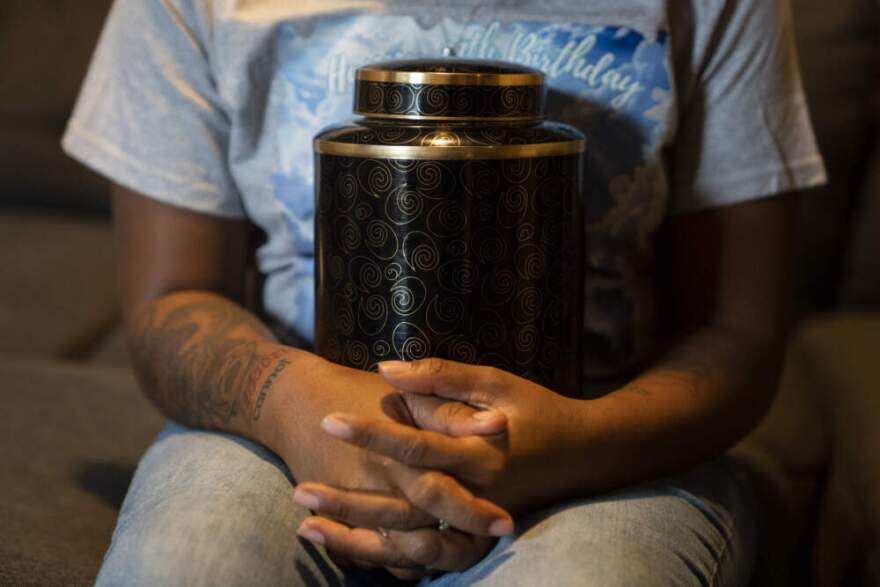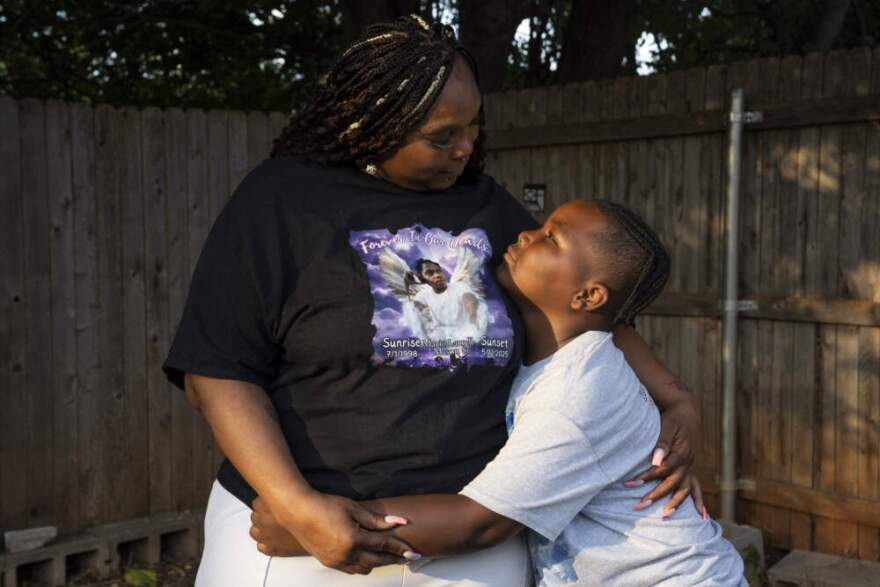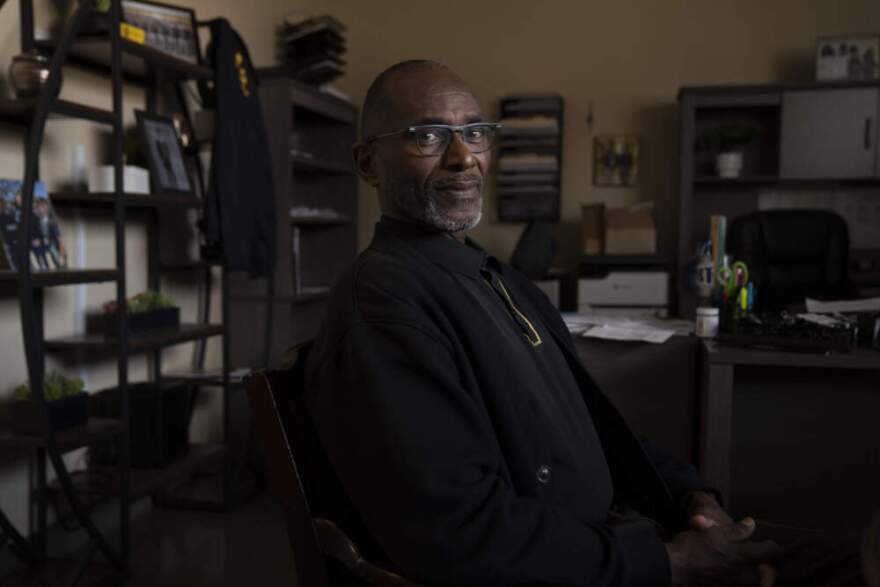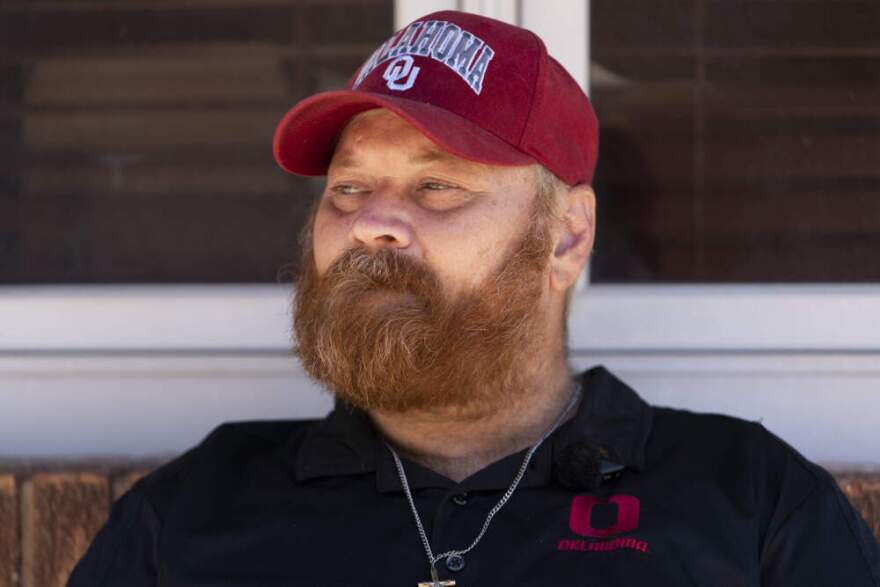
Soon after Mario Mason died in May, his mother went outside to find two visitors in her yard.
“One day, a blue jay and a red cardinal came, and they both landed on my porch right here,” Cicely Mason said. “I knew it was my baby.”
Now, at the feeder or on the fence, they visit every day. And it’s the jay that lingers. Cicely Mason said she had never seen a blue jay before her son died.

Mario Mason was a 26-year-old father. He died by suicide in the Oklahoma County jail soon after he was convicted of murder in a dispute over a stolen car.
According to a federal database obtained by the Marshall Project, nearly 900 incarcerated people died by suicide during a recent four-year period, making it a leading cause of death inside American jails.
“The system failed him,” Cicely Mason said. “And it’s sad, but my baby isn’t the only one that’s fallen to a broken system.”
Cicely Mason said her son had never shown signs of wanting to end his own life. But looking back on their final conversations, she said something had changed.
“He said that if he could choose us as a family again, he would,” Cicely Mason said. “You know your kids are hurting. And I just ignored all the signs of him telling me ‘bye.’”
A troubled jail
The building where Mason took his life is a drab brick tower near downtown Oklahoma City. There is a makeshift memorial by the jail’s front door, a bouquet of fading plastic flowers and a white stone for each person who has died inside.
A few years ago, the Oklahoma Disability Law Center, a nonprofit advocacy group, launched an investigation into conditions inside the jail and found the vast majority of people had a mental illness.
“It’s like 75% or more. And that’s been an ongoing statistic,” said Joy Turner, the Oklahoma Disability Law Center’s director of investigation and monitoring. “Oklahoma County jail is well known as being the biggest mental health hospital in Oklahoma.”
According to a database obtained by the Marshall Project, at least seven people died by suicide in the jail between 2019 and 2023. While the federal data is incomplete, it is one of the highest numbers of suicides reported to the government by any jurisdiction in the country.
Recent state inspections paint a troubling picture. They show inmates on suicide watch weren’t checked on every 15 minutes, as required. People throughout the jail routinely didn’t get medication prescribed by a doctor. On several floors, the inspections show that windows on cell doors were obscured, which means staff are unable to “ensure a presence of a living, breathing human body.”
Leadership in flux
In 2020, the county took control of the jail away from the sheriff. Now, it’s run by a local trust. But the problems persist. Nearly 60 people have died there since the trust took over. In 2021, police shot and killed an incarcerated person who took a guard hostage with a knife.
Leadership has also been in flux. This week, interim-CEO Paul Timmons abruptly resigned, becoming the third person in three years to vacate the top position.

On a busy day inside the jail last month, we spoke with Timmons. He didn’t dispute the jail’s troubled history.
“I know about the problems,” Timmons said in August. “Give me some answers to help me fix the problems.”
He said the bottom line is staffing. Timmons said the jail needs at least 40 to 50 more guards to be comfortably staffed, but recruitment has been difficult.
“It’s pay-related,” Timmons said. “If you can go to places like McDonald’s or a convenience store or whatever and make as much or more money than you can working here. Which would you choose?”
In 2022, voters approved a bond for a new jail. But the project is running over budget by hundreds of millions of dollars.
In the meantime, Timmons said the jail is installing radar technology that monitors breathing and heart rate inside the housing pods where people with mental illness are held.
A plan to get mentally ill people out of jail
Someone convicted of murder may not garner widespread sympathy, but even prosecutors in this deeply conservative state believe that people in jail for less serious crimes deserve help if they’re having a mental health crisis.
“It may not be politically correct, it may not even be politically popular, but it is a truth that if you send someone to jail with mental health, they are subject to being preyed on almost immediately,” said Jeffery Massey, an assistant district attorney for Oklahoma County.
He oversees the court-ordered outpatient treatment program known as CO-OP. It’s been around for about two years.
“That’s why we want to identify those people as quickly as possible, get them to treatment, so that suicide is not the option,” Massey said.
If someone with a serious mental illness is booked into jail, Massey’s office can drop those charges if they agree to treatment — even charges as serious as assaulting a police officer.

Staff at the Diversion Hub, an Oklahoma City organization that works to keep people out of the criminal justice system, help them find housing, keep them in therapy and on medication.
“We are ecstatic at the results that our red county in a red state has produced this type of dynamics,” Massey said.
So far, 135 people have graduated from the program. Michael Thayer is one of them.
“Being in the Oklahoma City Jail, it is a little tough in there,” Thayer said. “It’s stressful.”

He said his drug use, bipolar disorder and schizophrenia have landed him in jail a handful of times for beating up his dad.
“They weren’t so good about giving out meds, so it was more just sobriety and reading the Bible and getting sleep,” Thayer said.
When he got out of jail, he says the CO-OP program kept him off drugs and in counseling. He’s even rebuilt a relationship with his father.
“Me and him really kind of had a bonding experience,” Thayer said. “Working on my truck, he helps now. And I talk to him and we both respect each other. And my mom is real proud of me for everything I’ve been able to accomplish.”
A grieving mother
It’s been four months since Mario Mason died. Cicely Mason does what she can to stay connected with her son.
Every few days, she pours a bag of sunflower seeds into the bird feeder, hoping the blue jay will come for a visit.

When the feeder is full, she plays a Mother’s Day recording of Mason’s voice that she still clings to.
“I knew you would come, boy.” Mason said as the jay appeared. “So that makes me happy because lord knows I miss that boy.”
This reporting was supported by the John D. and Catherine T. MacArthur Foundation.
Editor’s note: If you or someone you know may be considering suicide or is in crisis, call or text 988 to reach the Suicide & Crisis Lifeline.
____
Peter O’Dowd produced and edited this segment for broadcast with Catherine Welch. Allison Hagan produced it for the web. Wilder Fleming contributed reporting.
This article was originally published on WBUR.org.
Copyright 2025 WBUR

